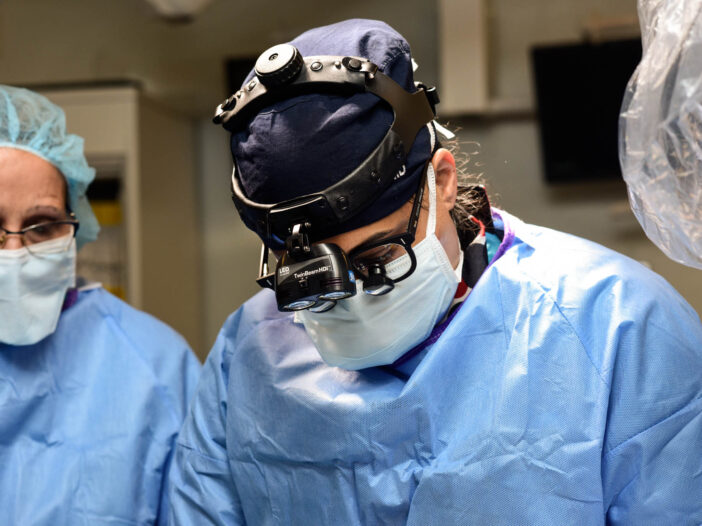
Good health begins with a strong heart and healthy blood vessels. Your heart pumps blood throughout your body through your blood vessels, delivering oxygen and other life-sustaining components to every one of your organs, tissues and cells.
When disease damages your blood vessels (vascular system) the vascular specialists at Central Maine Heart & Vascular Institute (CMHVI) can provide the care you need. We have the expertise and the state-of-the-art medical technology needed to manage the many different forms of disease and damage that can affect your body’s complex network of blood vessels.
About Vascular and Endovascular Surgery
The vascular system, also known as the circulatory system, is made up of blood vessels that carry blood throughout your body. Arteries carry oxygenated blood away from your heart; veins carry blood back from the body to your heart. Vascular diseases can damage your arteries or veins, reducing their ability to transport blood.
The vascular surgeons here at CMHVI can repair damage to arteries and veins, either with traditional vascular surgery or with endovascular surgery, which uses minimally invasive treatment procedures.
In addition to surgery, vascular surgeons provide a variety of treatment options, depending on the type and severity of vascular disease. Treatment may include medications and lifestyle changes.
Conditions We Treat
Vascular conditions and diseases can arise for many reasons. Unhealthy behaviors such as smoking, overeating and lack of exercise, as well as genetics, may result in the buildup of plaque and cholesterol, which can cause blockages. (Blockages near the heart are treated by cardiovascular surgeons.) Untreated blockages can cause strokes, loss of a limb or even death.
Your primary healthcare provider will refer you to a vascular surgeon as needed. For example, you might see a vascular surgeon if your primary care provider has diagnosed any of the following:
- Abdominal aortic aneurism (AAA): An aneurism is a bulge (or a ballooning) in the wall of an artery. It can be caused by factors such as atherosclerosis (also known as hardening of the arteries), high blood pressure, genetics, poor diet or smoking. Aneurysms can occur in the chest, abdomen and extremities. Over time, aneurisms can enlarge and rupture. This is especially typical of an abdominal aortic aneurysm; if an AAA ruptures, blood loss can cause death in minutes. In other parts of the body, the aneurysm may cause a clot that can lead to poor circulation to a limb. If left untreated, poor circulation can require amputation.
- Carotid artery disease: Caused by a build-up of plaque within an artery, carotid artery disease causes the artery to narrow, which restricts blood flow. The carotid arteries, which are in the neck, are the main route for blood supply to the brain. If a small piece of plaque breaks off in the carotid artery, it may travel to the brain and cause a stroke or a transient ischemic attack (TIA), known as a mini-stroke.
- Peripheral artery disease: Caused by a build-up of plaque in the leg arteries, peripheral artery disease restricts blood flow to the legs and feet. Patients may suffer muscle pain while walking, a condition known as claudication. In severe cases, PAD can cause severe foot pain or gangrene. Without prompt treatment, amputation may be necessary.
- Varicose veins: In healthy veins, valves help prevent blood from flowing backwards. In patients with a condition known as venous insufficiency, the valves are damaged and no longer work properly. Venous insufficiency causes leg veins to enlarge, twist and appear blue or purple, a condition called varicose veins. Although varicose veins are not necessarily a serious health risk, they can be painful and cause leg ulcers that are resistant to healing. In some cases, however, they can cause more serious issues including leg pain and swelling, as well as serious blood clots known as deep vein thrombosis.
Testing for Vascular Disease
Circulation problems can be difficult to diagnose and may appear to be other medical conditions. Also, some symptoms that mimic circulation problems are actually other physical problems, such as nerve or joint problems. A vascular surgeon is the best person to help you diagnose and treat any circulatory problem you may have.
We provide a full range of diagnostic tests for vascular diseases. Discuss your health with your primary care provider to determine whether you should be screened or examined for vascular diseases. Not all vascular diseases have noticeable symptoms in their early stages, so it’s important to tell your provider about any changes you may be noticing, however slight.
